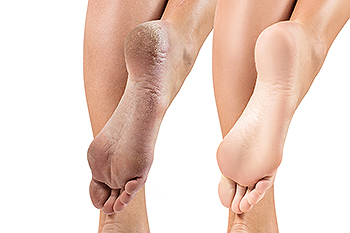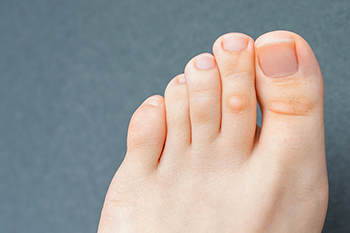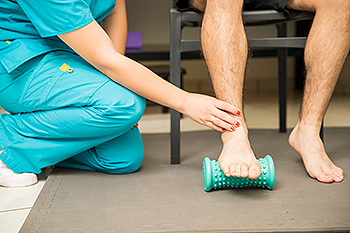
The main reason why cracked heels develop is a lack of moisture in the skin. It can happen for various reasons, consisting of standing on hard surfaces for most of the day and wearing shoes with an open back. Medical conditions such as dermatitis, eczema, psoriasis, or a thyroid disorder regularly have the symptom of cracked heels. Cracked heels can be unsightly and may develop into a serious foot condition if left untreated. The cracks can deepen and bleed, and these are known as fissures. One of the first signs this condition may be developing is thick skin on the edges of the heels. Temporary relief may be found when the feet are soaked in warm water, followed by applying a good moisturizer. Additionally, a pumice stone can be used to remove a portion of the thickened skin, and it may help to wear appropriate shoes that can provide adequate heel support. If you have developed cracked heels, it is suggested that you consult with a podiatrist who can offer you permanent relief, which may come from prescribed medicine.
Cracked heels are unsightly and can cause further damage to your shoes and feet. If you have any concerns, contact one of our podiatrists from Illinois . Our doctors can provide the care you need to keep you pain-free and on your feet.
Cracked Heels
Cracked heels appear unappealing and can make it harder for you walk around in sandals. Aside from looking unpleasant, cracked heels can also tear stockings, socks, and wear out your shoes. There are several methods to help restore a cracked heel and prevent further damage.
How Do You Get Them?
Dry skin is the number one culprit in creating cracked heels. Many athletes, walkers, joggers, and even swimmers suffer from cracked heels. Age and skin oil production play a role to getting cracked heels as well.
Promote Healing
Over the counter medicines can help, especially for those that need instant relief or who suffer from chronic dry feet.
Wear Socks – Wearing socks with medicated creams helps lock in moisture.
Moisturizers – Applying both day and night will help alleviate dryness which causes cracking.
Pumice Stones – These exfoliate and remove dead skin, which allows for smoother moisturizer application and better absorption into the skin.
Change in Diet
Eating healthy with a well-balanced diet will give the skin a fresh and radiant look. Your body responds to the kinds of food you ingest. Omega-3 fatty acids and zinc supplements can also revitalize skin tissue.
Most importantly, seek professional help if unsure how to proceed in treating cracked heels. A podiatrist will help you with any questions or information needed.
If you have any questions, please feel free to contact our offices located in Wheeling and Berwyn, IL . We offer the newest diagnostic and treatment technologies for all your foot care needs.




